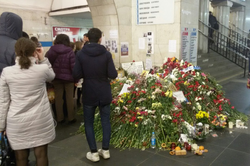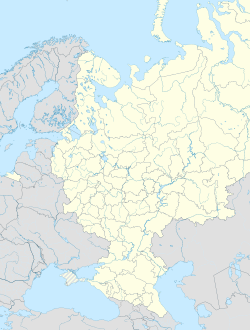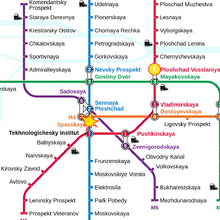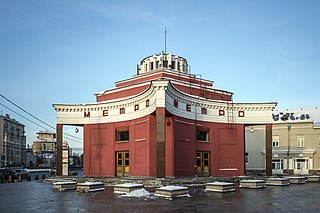
The Moscow Metro is a metro system serving the Russian capital of Moscow as well as the neighbouring cities of Krasnogorsk, Reutov, Lyubertsy and Kotelniki in Moscow Oblast. Opened in 1935 with one 11-kilometre (6.8 mi) line and 13 stations, it was the first underground railway system in the Soviet Union.

The Saint Petersburg Metro is a rapid transit system in Saint Petersburg, Russia. Construction began in early 1941, but was put on hold due to World War II and the subsequent Siege of Leningrad, during which the constructed stations were used as bomb shelters. It was finally opened on 15 November 1955.

Tverskaya is a station on Moscow Metro's Zamoskvoretskaya line. The station is along Tverskaya Street under Pushkin Square in Moscow. From its opening in 1979 until 1990, it was named Gorkovskaya, which was the name of Tverskaya Street during the Soviet times. After the government restored the Tverskaya name in 1990, the station's name was changed accordingly.
Terrorism in Russia has a long history starting from the time of the Russian Empire. Terrorism, in the modern sense, means violence against civilians to achieve political or ideological objectives by creating extreme fear.

The February 2004 Moscow metro bombing occurred on 6 February 2004 when a male suicide bomber killed 41 people near Avtozavodskaya subway station on the Zamoskvoretskaya Line in Moscow. Up to 250 people were injured in the incident, some of the more common injuries being broken bones and smoke inhalation.
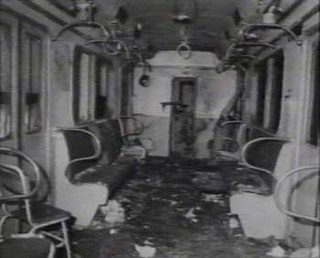
The 1977 Moscow bombings were a series of three terrorist bombings in Moscow on 8 January 1977. The attacks killed seven people and seriously injured 37 others. No one claimed responsibility for the bombings, although three members of an Armenian nationalist organization were executed early in 1979 after a KGB investigation and a secret trial. Some Soviet dissidents said that the suspects had an alibi. Soon after the event Andrei Sakharov issued a public appeal, expressing concern that the bombings might "be a new provocation on the part of the organs of repression". According to historian Jay Bergman, "who actually caused the explosion has never been determined conclusively".

The 2009 Nevsky Express bombing occurred on 27 November 2009 when a bomb exploded under a high speed train travelling between the Russian cities of Moscow and Saint Petersburg causing derailment near the town of Bologoye, Tver Oblast, on the Moscow–Saint Petersburg Railway. The derailment occurred at 21:34 local time. Russian officials had stated that 39 people were killed and 95 injured but later retracted that estimate. 27 deaths had been reported by 2 December. A second bomb exploded at the scene of the investigation the following day, injuring one. It was reported to have been triggered by a remote mobile phone.

The 2010 Moscow Metro bombings were suicide bombings carried out by two female Islamic terrorists during the morning rush hour of March 29, 2010, at two stations of the Moscow Metro, with roughly 40 minutes in between. At least 40 people were killed, and over 100 injured.
The August 2004 Moscow metro bombing took place at about 20:17 MSK on 31 August 2004, when a female suicide bomber blew herself up outside Rizhskaya metro station, killing at least 10 people and wounding 50.
The 1994 Baku Metro bombings was a series of terrorist incidents in Baku, Azerbaijan. The first attack was perpetrated at the "20 January" metro station, while the second one took place between the "28 May" and "Ganjlik" stations. As a result of the first attack, 14 people were killed and 49 wounded. The second attack resulted in 13 people killed and 42 injured.

The Domodedovo International Airport bombing was a suicide bombing in the international arrival hall of Moscow's Domodedovo International, in Domodedovsky District, Moscow Oblast, on 24 January 2011.

The 2011 Minsk Metro bombing took place on 11 April 2011 when 15 people were killed and 204 were injured when a bomb exploded within the Minsk Metro, Belarus. The explosion happened at the central Kastryčnickaja station at 17:55 local time.

Piter is a novel written by Russian author Shimun Vrochek. Piter is part of Universe of Metro 2033, a long-running series of post-apocalyptic short stories, novellas, and novels, spanning a variety of genres. The works are written by several different authors. Piter was originally published in February 2010. Although there is currently no English version of the book, Piter has been translated into a number of other European languages, such as German, Polish and Spanish. The novel was translated to Polish by Paweł Podmiotko.
On 15 July 2014, at around 8:40 am MSK (UTC+04:00), an outbound Moscow Metro train derailed between Park Pobedy and Slavyansky Bulvar stations of the Arbatsko-Pokrovskaya Line. Casualties reported include 24 dead and 160 injured. Early reports suggested a power surge or a terrorist attack to be the cause of the derailment, but both were soon dismissed.

Khovrino is a station on the Zamoskvoretskaya line of the Moscow Metro. The station opened on 31 December 2017. It is the northern terminus of the line, and the closest subway station to the Sheremetyevo International Airport.
This article lists events from the year 2016 in Russia.

On 2 April 2023, a bombing occurred in the Street Food Bar No.1 café on Universitetskaya Embankment in Saint Petersburg, Russia. Russian military blogger Vladlen Tatarsky, real name Maxim Fomin, died as a result of the explosion and 42 people were injured, 24 of whom were hospitalized, including six in critical conditions.
